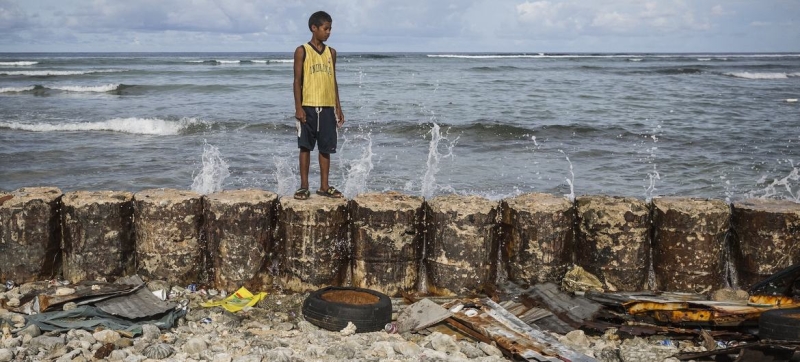- Economy Stabilises Unevenly as Banking Crisis Drags Growth |
- Jamaat Signals Openness to Unity Government After Polls |
- Let's build a society of love, tolerance, peace and harmony: Tarique Rahman |
- Bangladesh at a Crossroads as 2025 Reshapes the Nation |
- Khaleda Gets Eternal Farewell from Over a Million of Hearts |
World Leaders Warn of Urgent Climate Action at UNGA

© UNICEF/Vlad Sokhin Even with a seawall, high tides flood the yard of this 13-year-old’s home in Majuro Atoll, Marshall Islands.
From the rainforests of Central America to low-lying atolls in the Pacific and drought-stricken plains in Africa, leaders came to the United Nations General Assembly on Wednesday with a common message: climate change is no longer a distant threat, but an immediate danger demanding bolder global commitments.
Their appeals, sharpened by rising seas, failed harvests and disappearing ecosystems, echoed Secretary-General António Guterres’s warning at a climate summit that the world is already in the “dawn of a new energy era” – one where clean energy must replace fossil fuels, and where finance and justice remain at the heart of the global response.
“The bottom-line: clean is competitive and climate action is imperative,” he declared, calling for “dramatic emissions cuts” aligned with the 1.5°C goal of the landmark Paris Agreement on climate change, agreed by all nations in 2015.
“We know it can be done ... COP30 in Brazil must conclude with a credible global response plan to get us on track,” he added, referring to the 30th UN climate change conference in November, which aims to accelerate global efforts to limit temperature rise and advance commitments on emissions, adaptation and climate finance.
The UN chief’s urgency provided the backdrop as world leaders presented compelling accounts of climate peril and promise on the second day of the Assembly’s annual general debate.
Spain – Accelerate energy transition
The “triple planetary crisis” – climate change, pollution and biodiversity loss – featured prominently in the address by King Felipe VI of Spain, who underscored that governments must accelerate a just energy transition.
He pressed for tripling renewable capacity, doubling efficiency and advancing decarbonisation in time for COP30, where Spain hopes to see consensus and ambition.
“These objectives are as ambitious as they are necessary,” he said, cautioning that hesitation can no longer be part of the global equation.
Panama – Nature, the first line of defense
For Panama, which has long championed conservation despite contributing little to global emissions, the call was for integrated action.
President José Raúl Mulino Quintero unveiled the country’s ‘Nature Pledge,’ a single framework uniting commitments on climate, biodiversity and land.
He stressed that as a carbon-negative country, Panama will go even further by restoring 100,000 hectares of priority ecosystems, from mangroves to watersheds.
“Nature is our first line of defense against climate change,” he said, linking national resilience to global solidarity.
Comoros – Small island, big stakes
In the Indian Ocean, the Comoros faces a different frontline.
President Azali Assoumani spoke of rising seas, coastal erosion and intensifying cyclones that threaten the archipelago’s villages and ecosystems.
He urged equitable, simplified access to climate finance, insisting that small island states cannot wait on cumbersome mechanisms while their homes wash away.
At the same time, he highlighted his country’s ‘Emerging Comoros Plan,’ built on renewable potential, blue economy resources and digital transition. But without international support, he warned, such plans risk being hampered by debt and global inaction.
Namibia – Linking climate action to desertification
Namibia’s President Netumbo Nandi-Ndaitwah tied climate impacts directly to her country’s daily struggles, citing prolonged droughts and floods that have dried rivers and disrupted lives.
She announced Namibia’s bid to host the Africa regional hub of the Green Climate Fund, positioning the country as a bridge for climate finance on the continent.
She also reinforced the need to implement the ‘Namib Declaration’ to combat land degradation, linking climate action with the fight against desertification.
Guyana – Nature’s tangible value
In South America, Guyana’s President Mohamed Irfaan Ali emphasised that climate and development cannot be separated.
He described how his country is protecting forests, strengthening sea defenses and advancing a low carbon development strategy to prove that economic growth can go hand-in-hand with environmental stewardship.
Guyana, he noted, has become a seller of carbon credits under international standards, showing that “nature has tangible value.”
Marshall Islands – Promises won’t save sinking atolls
For the Marshall Islands, a Pacific nation of more than 1,200 islands and 29 coral atolls, climate change is a question of survival.
President Hilda Heine delivered one of the day’s most urgent interventions, warning that promises alone cannot save sinking atolls.
“We’ve heard the promises – but promises don’t reclaim land in atolls. They don’t develop mangrove defenses, shore up our hospitals and schools against rising seas or preserve cultural stability tied to land that is slipping under waves,” she said.
“Those things require money.”
Ms. Heine pressed the international community to close the trillion-dollar climate finance gap, particularly for adaptation and loss and damage.
As COP30 approaches, she said nations must not only honour their pledges but also deliver stronger plans that show a clear pathway to phasing out fossil fuels and halving global emissions within this decade.

